|
|
|
Sort Order |
|
|
|
Items / Page
|
|
|
|
|
|
|
| Srl | Item |
| 1 |
ID:
193006
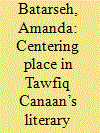

|
|
|
|
|
| Summary/Abstract |
In the early-twentieth century, Palestinian physician and ethnographer Tawfiq Canaan published roughly forty-five studies on the cultural and narrative traditions of the largest section of Palestinian society, the fellaheen (peasantry). In this article, the author examines how Canaan’s expansive collection of stories related to holy sites across Palestine in Mohammedan Saints and Sanctuaries in Palestine (1927) produces a provocative literary cartography—a narrative that operates much like a map. In so doing, she contends that Canaan both contests orientalist constructions of the Holy Land as frozen in biblical time and, critically, unsettles the very spatiotemporal logic governing dominant colonial narrations of place. This epistemic shift, the author concludes, is the result of Canaan’s recentering of Indigenous Palestinian place-based knowledge as both the subject and method of his study. This approach offers instructive lessons applicable within and beyond the disciplinary, regional, and temporal boundaries that have so far circumscribed the study and reception of Canaan’s work.
|
|
|
|
|
|
|
|
|
|
|
|
|
|
|
|
| 2 |
ID:
193007
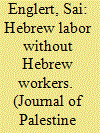

|
|
|
|
|
| Summary/Abstract |
The Histadrut was founded in 1920 to organize the so-called Zionist conquest of labor, which aimed to exclude Palestinian workers from the economy. While this ideology was central to the Yishuv, labor shortages and settler-colonial expansion following the establishment of the State of Israel in 1948 led to the integration of Palestinian workers in the workforce. Focusing on the construction industry, this article explores the ways in which the Histadrut’s contemporary membership structure, collective agreements, and relationship to the Israeli state serve to further institutionalize a highly racialized and segregated sector. Palestinian and migrant construction workers toil in dangerous circumstances for low pay, without union protection, and under the supervision of unionized Jewish managers and engineers.
|
|
|
|
|
|
|
|
|
|
|
|
|
|
|
|
| 3 |
ID:
193008
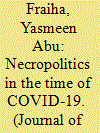

|
|
|
|
|
| Summary/Abstract |
The COVID-19 pandemic reached all parts of historic Palestine around the same time, but by the end of December 2021, only 29.02 percent of Palestinians in the West Bank and Gaza were fully vaccinated compared to 63.82 percent of Israelis (including Palestinians with Israeli citizenship). The mortality rate from COVID-19 in the West Bank and Gaza was also higher, with 941.84 deaths per million, compared to 887.20 in Israel. This essay argues that these differences are a direct result of Israel’s COVID-19 response policies toward the Palestinians throughout the pandemic, as well as its ongoing siege of Gaza and its military occupation of the West Bank, including East Jerusalem. The analysis is framed through the lens of necropolitics, defined as the use of political power to decide who lives and who dies. Using the four waves of the COVID-19 pandemic across historic Palestine as a case in point, the essay focuses on the different political states in which Israel abused necropolitical power: the states of emergency, exception, siege, and acceptance.
|
|
|
|
|
|
|
|
|
|
|
|
|
|
|
|
| 4 |
ID:
193009
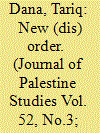

|
|
|
|
|
| Summary/Abstract |
The normalization of relations between the United Arab Emirates (UAE) and Israel under the Abraham Accords is part of a long-standing security cooperation between the two regimes to monopolize regional power. Indeed, with the rapidly changing political and security landscape in the Arab world, the Abraham Accords have become central to understanding alliance formation in the region. The Accords have significantly enhanced the already existing security and military relations between Israel and the UAE, with heavy Emirati investment in advanced Israeli weapons systems and security technologies, military and intelligence sharing, as well as economic partnerships in strategic sectors. While the alliance is often portrayed as a defensive security arrangement aimed at countering the “Iranian threat,” a closer examination reveals that it is much more than that. Sponsored by the United States, the alliance entrenches Israeli settler colonialism and Arab authoritarianism as mutually inclusive pillars for the region, with the ultimate objective of reproducing US hegemony in the face of changing global dynamics.
|
|
|
|
|
|
|
|
|
|
|
|
|
|
|
|
| 5 |
ID:
193011


|
|
|
|
|
| Summary/Abstract |
In Fi al-adab al-sahyuni (On Zionist Literature, 1967)Footnote1, the Palestinian writer and Popular Front for the Liberation of Palestine (PFLP) spokesperson Ghassan Kanafani provides an analysis of Zionist literary production from the early nineteenth century through the mid-twentieth century, situating it in a broader schema of Western imperialism, settler colonialism, and dispossession in Palestine. Through a treatment of the early Zionist texts, Kanafani’s study traces the evolution of literary representations of the Jewish subject and explores their utility in repudiating integration and advancing racial supremacist logics. The Zionist works in question venerate different relationships to land—extractive, romantic, fraudulent—in contrast to those of Palestinian literary and oral traditions; the former are connected to the ongoing, material efforts of colonizing Palestine. Kanafani’s study was drafted in Beirut and is a reflection of the broader sweep of Arab nationalist and anti-colonial cultural production during the 1960s and 1970s, which was targeted by an anti-communist West. These experiences were formative for Kanafani’s intellectual project, which sees literary criticism as a revolutionary tool and a direct extension of armed resistance, whereby a cultural reconstitution can be used in service of liberating both Palestinian land and people. Kanafani’s study suggests that the “weapons” of literary production will be most effectively brandished by the Arab youth who lead the struggle against Zionism.
|
|
|
|
|
|
|
|
|
|
|
|
|
|
|
|
| 6 |
ID:
193010
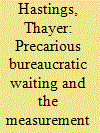

|
|
|
|
|
| Summary/Abstract |
When Palestinian Jerusalemites refer to “the ministry” (al-dakhliya), they also refer to the sense of weightiness, lost time, frustration, exhaustion, and anxiety that accumulate to the Israeli Ministry of Interior located in the East Jerusalem neighborhood of Wadi al-Joz. Multiple pressures and limited access produce tedious and outright cruel conditions for Palestinians visiting the institution. This essay attends to the affective associations and meanings the institution represents to Palestinians in Jerusalem by drawing on the author’s own experiences there and while conducting ethnographic fieldwork, including conversations and interviews with interlocutors, journalistic reporting, fiction writing, and an examination of Google reviews of the ministry. It attempts to appreciate how the experience of delay at the ministry is configured as a tool of punishment within the context of ongoing Israeli settler colonialization.
|
|
|
|
|
|
|
|
|
|
|
|
|
|
|
|
|
|
|
|
|